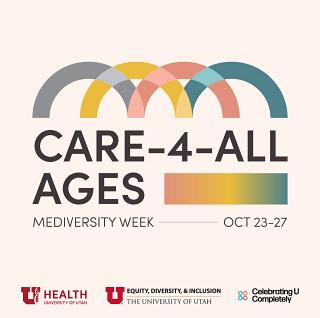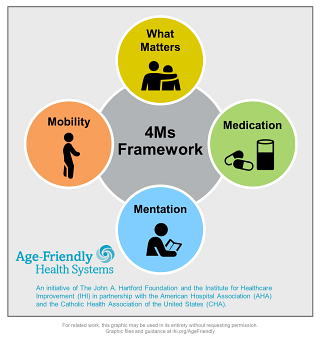Confronting ageism at U of U Health to deliver “Care-4-All Ages”
Confronting ageism at U of U Health to deliver “Care-4-All Ages" University of Utah Health Sciences


MEDiversity Week 2023: Care-4-All Ages

This report highlights the significance of the Sustainable Development Goals (SDGs) in the context of MEDiversity Week at the University of Utah. The theme for this year’s MEDiversity Week is “Care-4-All Ages,” with a particular focus on addressing ageism in the healthcare field and the recent designation of U of U Health as an Age-Friendly Health System. The aim is to draw attention to the importance of designing and delivering care that meets the needs of every person, regardless of age.
The Impact of Ageism in Healthcare
According to a recent study, ageism in healthcare has resulted in more than 17 million additional health condition cases and costs approximately $63 billion annually. This staggering sum is attributed to overmedication, misaligned treatment plans, and inequitable health outcomes. As the size of the US population aged 65 and above is expected to double by 2050, there is a pressing need to address ageism in healthcare systems to meet the growing demand.
The 4Ms Framework
This year’s MEDiversity Week also spotlights the 4Ms framework, developed by the John A. Hartford Foundation. The 4Ms framework provides a set of principles that can guide efforts to combat ageism in healthcare. The principles include:

- What Matters: Know and align care with each older adult’s specific health outcome goals and care preferences, including end-of-life care, across different care settings.
- Medication: Use Age-Friendly medication that does not interfere with What Matters to the older adult, Mobility, or Mentation across different care settings.
- Mentation: Prevent, identify, treat, and manage dementia, depression, and delirium across different care settings.
- Mobility: Ensure that older adults can move safely every day to maintain function and do What Matters.
MEDiversity Week 2023
MEDiversity Week is scheduled to take place from October 23 to 27. The week will feature several panels, workshops, a film screening/discussion, and a keynote address. For more information about the planned events and activities, please visit the MEDiversity Week website.
SDGs, Targets, and Indicators
1. Which SDGs are addressed or connected to the issues highlighted in the article?
- SDG 3: Good Health and Well-being
- SDG 10: Reduced Inequalities
The article discusses the importance of addressing ageism in the healthcare field and designing care that meets the needs of every person, regardless of age. This aligns with SDG 3, which aims to ensure healthy lives and promote well-being for all at all ages. Additionally, the article mentions the growing population of individuals aged 65 and above, highlighting the need to address inequalities and ensure equitable health outcomes, which is connected to SDG 10.
2. What specific targets under those SDGs can be identified based on the article’s content?
- SDG 3.8: Achieve universal health coverage, including financial risk protection, access to quality essential healthcare services, and access to safe, effective, quality, and affordable essential medicines and vaccines for all.
- SDG 10.2: By 2030, empower and promote the social, economic, and political inclusion of all, irrespective of age.
The article emphasizes the need to address ageism in healthcare and ensure that care is designed and delivered to meet the needs of every person. This aligns with SDG 3.8, which aims to achieve universal health coverage and access to quality healthcare services for all. Additionally, the article highlights the importance of promoting inclusion and reducing inequalities, specifically mentioning age-related inequalities. This is connected to SDG 10.2, which aims to empower and promote the inclusion of all individuals, irrespective of age.
3. Are there any indicators mentioned or implied in the article that can be used to measure progress towards the identified targets?
- Indicator for SDG 3.8: Proportion of the population with access to affordable essential medicines and vaccines on a sustainable basis.
- Indicator for SDG 10.2: Proportion of individuals who feel respected and valued regardless of their age.
The article does not explicitly mention specific indicators, but based on the identified targets, potential indicators can be derived. To measure progress towards achieving SDG 3.8, the proportion of the population with access to affordable essential medicines and vaccines can be monitored. For SDG 10.2, the proportion of individuals who feel respected and valued regardless of their age can serve as an indicator to assess progress in promoting inclusion and reducing age-related inequalities.
Table: SDGs, Targets, and Indicators
| SDGs | Targets | Indicators |
|---|---|---|
| SDG 3: Good Health and Well-being | Achieve universal health coverage, including financial risk protection, access to quality essential healthcare services, and access to safe, effective, quality, and affordable essential medicines and vaccines for all. | Proportion of the population with access to affordable essential medicines and vaccines on a sustainable basis. |
| SDG 10: Reduced Inequalities | By 2030, empower and promote the social, economic, and political inclusion of all, irrespective of age. | Proportion of individuals who feel respected and valued regardless of their age. |
Behold! This splendid article springs forth from the wellspring of knowledge, shaped by a wondrous proprietary AI technology that delved into a vast ocean of data, illuminating the path towards the Sustainable Development Goals. Remember that all rights are reserved by SDG Investors LLC, empowering us to champion progress together.
Source: uofuhealth.utah.edu

Join us, as fellow seekers of change, on a transformative journey at https://sdgtalks.ai/welcome, where you can become a member and actively contribute to shaping a brighter future.







